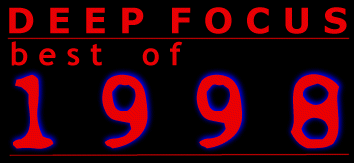

|
[ . . . of 1997 | . . . of 1996 ] (In order of preference) |
 Hana-Bi (Milestone Films)
Hana-Bi (Milestone Films)Japanese yakuza-pic auteur Takeshi Kitano was responsible for the single most exquisitely crafted film to reach American soil in 1998. Hana-Bi (English title: Fireworks) is the kind of picture that makes Quentin Tarantino eat his heart out -- it's violent and heartbreaking, relentlessly visceral and quietly reflective. Kitano plays one of his signature characters, an aging cop whose internalized grief for his dying wife manifests itself in sudden explosions of violence. A meditation on love, work, and death, Hana-Bi regards the flower and the fire that drive the human spirit with an awesome ambivalence. |
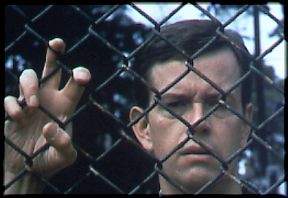 Happiness
Happiness(Good Machine Releasing) My favorite American film of the year was this almost unbearably self-assured essay on what happiness isn't. Like director Todd Solondz's previous Welcome to the Dollhouse, it's easy to read this stuff as smug, dehumanizing drivel from an independent auteur who thinks condescension is hip. Yes, the film is funny. Its occasional money shots are just as cheap and twice as sleazy as anything in There's Something About Mary. Now, if I believed that Solondz was simply mocking his characters, setting them up for a fall and then laughing in our faces for buying a ticket to their abject humiliation, I'd be plenty pissed off at him. What I find fascinating and disturbing is the intimacy with which Solondz paints these grotesque family portraits. Happiness includes the single finest scene of the year, a triumph of performance and direction that has a young boy coming face to face with his father's pedophilia, asking the most searching questions with an innocence and tearful candor -- it's the film's scorching climax, and an oddly cathartic triumph. The characters are written and played so that the darker themes become characters themselves, suggesting that the kid is confronting an incipient interior monster, rather than just his sick father. In this way, it's an eloquent exploration of the ways that childhood can be damaging to the soul. Four months later, I still can't imagine what it would be like to watch that scene without feeling that a big dark hole was opening up somewhere inside of me. Seeing this film may have been a punishing experience, but it was also an uncommonly rewarding one -- cheaper and funnier than therapy, and probably more therapeutic, too. |
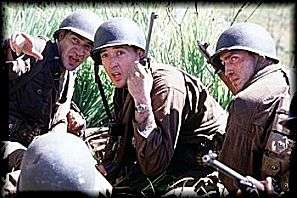 The Thin Red Line
The Thin Red Line(Fox) The first two hours of The Thin Red Line are masterpiece material, hands down. Terrence Malick makes expert use of interior monologue to introduce his characters and dramatize their moral and emotional struggles through voiceover. Complaints that the prose spewing forth was florid and inaccessible missed the point, which is to suggest that even soldiers can retain a metaphorical poetry of the soul. Importantly, the poetry is balanced by one of the most impressive narrative sequences of the year, an hour-long foray into enemy territory that makes a subtler, more fluid counterpart to Saving Private Ryan's balls-out cinematic shock tactics. Although I'm a little ambivalent about Malick's internalized epic, which comes dangerously unraveled right at the two-hour mark, I'm giving it the nod over Ryan because it taps into something greater than its historical context. While Saving Private Ryan was a terrific movie about World War II -- I don't think any other conflict could have been the setting for a movie that confident of its ultimate rightness -- Malick's film is about the greater presence of war in human history, in the context of a nearly mystical reverence for nature that begs the question of what the hell we think we're doing on this planet, anyway. "How did we lose the good that was given us?" asks our first-person narrator at one point, although the movie never pretends the question can be answered. The only certainty is that the question must be asked. |
I'm not citing this one just because Sinead O'Connor was cast as the Virgin Mary, although that's a contributing factor. Nor am I enamored of it just because, like Happiness , it's a harrowing tale of childhood gone horribly wrong. And it didn't grab my attention just because its demonstration that impudent madness can have its rewards is often scarily funny. No, the key factor in this movie's success is a truly credible, evocative performance by a very young actor. In this case, it's Eammon Owens, who is never less than completely convincing as the cute redheaded lad gone wrong. Or, rather, going wrong as we watch. This is an effective case study, the year's best psycho killer film, and a welcome return to form for a wayward Neil Jordan.
|
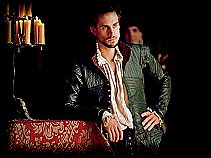 Shakespeare in Love
Shakespeare in Love (Miramax/Universal) Unlike lesser films, Shakespeare in Love doesn't want to be taken seriously as a historical piece or a literary comedy. Screenwriters Marc Norman and Tom Stoppard believe in love, L-U-V, and they lay it on thick. As such, it's absolutely shameless -- which is crucial to the intended blissful sensation. John Madden choreographs a deft ensemble in the act of pretending: Ralph's kid brother Joe Fiennes pretends to be Bill Shakespeare, Rupert Everett pretends to be Christopher Marlowe, Gwyneth Paltrow pretends to be a boy, and Judi Dench just stops everybody else dead in their tracks whenever she shows up as Queen Elizabeth. As calculated as some of this is, I can't find it in my heart to be cynical. This one plastered a silly grin on my face by the end of the first reel and kept it there until the final fade-out, which is something of a monumental achievement considering how grumpy the movies have made me lately. |
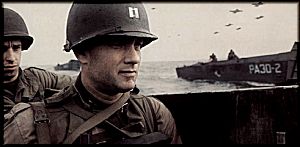 Saving Private Ryan (Dreamworks SKG)
Saving Private Ryan (Dreamworks SKG)Maybe this one should be higher on the list; I'm not sure. I've docked it a couple of notches for fading in my memory, especially in terms of the drastic imbalance between the harsh brilliance of the opening skirmish at Normandy and the rather humdrum mechanics of the rest of the story. In all, not quite the masterpiece it's been made out to be, but still an expert piece of work from the Spielberg dream factory. I'm already looking forward to his next picture, Minority Report, which looks to continue his current (and admirable, if you ask me) plan of alternating "serious" films with crowd-pleasing blockbusters. It pleases me no end that Saving Private Ryan, a serious, reasonably challenging film that was also a popular sensation, brings him one step closer to a point where that distinction doesn't matter so much anymore.
|
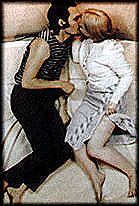 Buffalo 66
Buffalo 66 (Lion's Gate Films) This one irritated me when I was watching it, but in retrospect it became clear that it's a keeper, and I look forward to catching it again on video. What's indisputable, in my mind, is that Vincent Gallo is both a serious talent as a director and an arresting presence on the screen. (He knows how to photograph himself, too, which is how narcissism becomes a big advantage.) I could do without some of his metacinematic flourishes, like the awkward staging of dinner with the parents, or the sudden fragmentation of the screen into a flashback mosaic as fucked-up protagonist Billy Brown waits for a bus. But elsewhere, his visual sense is hip and refreshing, and at least he uses the gimmicks in the service of narrative, rather than the other way around. Buffalo 66 also includes the year's best performance by Christina Ricci (is that a category yet?), cementing Gallo's claim to directorial debut of the year. |
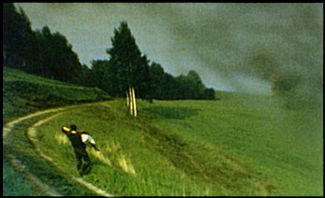 Mother and Son
Mother and Son(International Film Circuit) If one measure of a film is its ability to linger in the memory for days, weeks, months and perhaps years after viewing, then Aleksandr Sokurov's Mother and Son surely approaches greatness. An exquisitely slow, painterly reflection on the act of caring and letting go, Mother and Son makes the films of Andrei Tarkovsky look positively frenetic by comparison. Tarkovsky is, however, the obvious antecedent for this picture, which is the only work of Sokurov that I've seen. (I also detect a bit of Dreyer and maybe Angelopoulos in these bleak, expressionist tableaux.) It's the story of a son caring for his dying mother in the largely deserted Russian countryside, told in a smattering of very long shots taken through distorted lenses and mirrors. One's reaction to this film will likely be intensely personal, and many won't care for it at all. To me, the distended visuals had the impact of cataracting the camera's eye, and thus the very eye of the cinema. After more than 100 years of reinventing human vision, perhaps it's true that cinema itself is near death. I was lucky enough to see this on the big screen at the stately Castro Theater in San Francisco, a suitable venue for such ruminations. Your experience will vary, and be warned that many modern filmgoers have trouble thinking of this sort of carefully rendered chamber piece as a "movie" at all. |
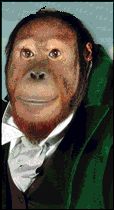 Babe: Pig in the City
Babe: Pig in the City (Universal) Fact is, children's stories have long borne with them a heaping helping of fright, whether it's to teach a moral lesson or simply to give the youngsters some inkling of the hazards lurking in the wider world. (See Wes Craven's New Nightmare for a digression on this subject.) So don't ask me why America's parents decided, apparently en masse, that |
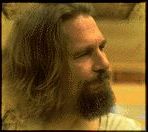 The Big Lebowski
The Big Lebowski(PolyGram) (Or, if you prefer, see the list below. This was really a 10-way tie for last.) On a repeat viewing, Lebowski's flaws became all the more apparent, particularly the script's flabby, uncohesive (as opposed to incoherent) second half. On the other hand, the first half is so wryly, riotously funny that it seems a nearly indispensable part of recent film history. The pleasures in the offing here are as verbal as they are visual - MVPs are cinematographer Roger Deakins, screenwriters Coen and Coen, and, last but not least, the astonishing slacker turn of Jeff Bridges as the Dude that abides. Later on, the narrative becomes a little too circuitous, the characters turn a little too wacky, and the Coens try too hard to top themselves. Me, I can't wait to see what they come up with next. |
|
Honorable Mention
Great Performances (in alphabetical order) Dylan Baker, Happiness
The Women
Jane Adams, Happiness
|
